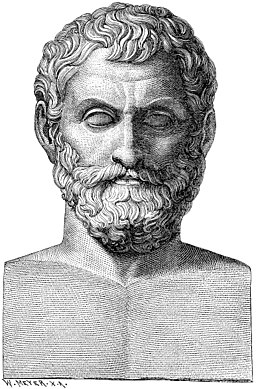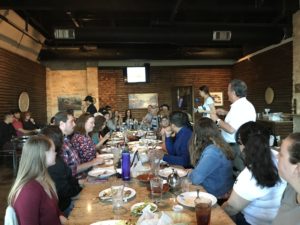Today is the traditional birthday of philosophy, May 28, 585 BCE. It’s a great story, so I’ll tell a version of how philosophy was born.

dispatches from the dean
Today is the traditional birthday of philosophy, May 28, 585 BCE. It’s a great story, so I’ll tell a version of how philosophy was born.

When I was a naïve novitiate psychotherapist, I had the good fortune of a psych hospital’s support to attend professional conventions, partly to learn, and partly to represent the hospital. I remember my first psychoanalytic convention: I was thrilled to sit in the presence of famous psychoanalysts, soaking up their wisdom. I was at just such a convention when I had my first shot of Universal Solvent, neat.
I’m curious about what you’re curious about, and that’s the point of Curiosities. More or less.
There are questions, and there are answers. The trick is to find matching pairs.
More Curiosities coming soon.
I recently read “Part-time students receive attention” on the TCCTA site. I want to share this article with you if you haven’t seen it, and I’d like your indulgence to raise two issues, for reflection.
First, we’ve all heard the claim that full-time students tend to graduate. Reactions to this range from a broad yawn to injunctions to sign everyone up for a full-time load the next available opportunity. Of course, we are not merely interested but also committed to student progression and completion, but I see taking comfort in this dictum to be a bit one-dimensional. After all, my Inner Philosopher urges me to say, the causality might run the other way: Graduating may cause you to take 30 hours a year.
I wrote this a while ago for another blog, but — in this season of conflict that we call the last week of the term — I thought I’d share it with you.
“We’re having a conflict, and we need help resolving it.”
This familiar sentiment often brings people in to see therapists and counselors, (and even philosophers!), and most people start off seeking conflict resolution. Let’s think about this notion of conflict resolution.
First, some preparatory observations. Suppose I ask you, What is the absence of conflict? Is it peace? Harmony? Equanimity of mind? While there’s some truth to responses in this vein, if you look a little harder at conflict, you might begin to suspect that the absence of conflict is . . . death.

Last week, I had the good fortune to attend an end-of-the-term dinner with Fahim Idais and forty or so of his Arabic students. The company was great, and the food was magnificent — we practically took over the Phoenician Resto Café. Other than the baba ganoush, one of the highlights of the evening was that I got a crash course in Arabic greetings when Fahim had all the students go around the table and introduce themselves. How’s this:
مرحباً
اسمي ماثيو
 I’m proud of our Arabic program, and of the department of foreign languages that supports and sustains it. Not many community colleges can boast about offering so many languages. The central image for our recent International Festival features most of them: Russian, Spanish, Japanese, French, Chinese, German, Italian, and Korean. ACC also teaches ASL and Latin. And English. 😉
I’m proud of our Arabic program, and of the department of foreign languages that supports and sustains it. Not many community colleges can boast about offering so many languages. The central image for our recent International Festival features most of them: Russian, Spanish, Japanese, French, Chinese, German, Italian, and Korean. ACC also teaches ASL and Latin. And English. 😉
 Did you know we offer Arabic I through IV? We have an AA in Arabic, too.
Did you know we offer Arabic I through IV? We have an AA in Arabic, too.
Why do we teach Arabic at ACC?
Because people first started talking about the concept of zero in Arabic.
Because it’s one of six official languages of the United Nations.
Because it was a major artery of culture in the Middle Ages.
Because Arabic is spoken by 313 million people today.
Because Aristotle’s works were preserved in Arabic.
Because it’s the lingua franca of the Arab world.
Because it’s the language of the Qur’an.
Because Arabic grammar is sweet.
Because ACC is happening.
Because it’s there.
Why not?
As dean, I get to experience pretty amazing things, but this time, it wasn’t just a dean thing. Rather, I was invited to this party, by one of the Arabic students. Let me put it like this:
أنا والد لويزا
Thanks, Luiza!
And thanks to you, Fahim, for everything you do for our students!
I want to take a moment to tell you how much I appreciate your work, your dedication, and your presence on our campuses and in our departments. The work you do makes our mission happen — serving students and our communities.
When I talk to colleagues about our mission as professors, I like to point out that the days of renting a classroom, professing a discipline, and conferring degrees, single-handed, ended in about AD 1300. As professors, we don’t — and can’t — go it alone. It takes all the people at the institution, top to bottom, to make our work as professors possible — especially our administrative staff. You are not a luxury! You’re on the front lines of our mission, every day.
Keep up your great work and attitude! If there’s anything I can do to make your work more effective, please let me know.
Think about your day. Whatever challenges you’re facing today, think of all the tasks you’d have to undertake first, just to go about your business, if you couldn’t rely on administrative assistants to prepare the way for you.
Now, isn’t that a pleasant thought? Personally, I would resign and try my luck as a döner vendor in Vienna.
Come back to reality now, and take a moment to thank an admin.
The Spanish Program just added two more online courses this summer to help you meet your goals. You can complete your summer language study plans with Spanish III (2311) or Spanish IV (2312), both just added to the 11-week term!
If you want to review and/or quickly meet your goals, we also offer intensive six-week summer courses, back to back — which means you can take Spanish I and II or Spanish III and IV this summer.
¿Adónde vas? Our online sections fill quickly, so sign up now!
Want a little help? ¡No te vayas! See an ACC advisor or get in touch with the Department of Foreign Languages (512-223-0061)
Each year since the beginning of Vision+Voice five years ago, I have looked forward to the reception. We unveil the posters that unite our V+V poets’ work with ACC art student creations. We hand out the coveted anthology of the year’s poems. We’re treated to our poets reading their poems, to congratulations and addresses by dignitaries like Dr. Rhodes and Dr. Cruz, thank-you’s to parents and teachers. And we have really, really good food.

This year’s reception was especially lovely, with a return appearance by Brad Richard, whose reflections on the V+V poems brought tears to my eyes. (And I wasn’t the only one.) Brad has done so much for poetry that it’s hard to know where to begin a thank-you note. Maybe this will be a start?
My guest author today is Desiree Morales, who writes in response to Claudia Rankine’s Citizen, the Big Read book choice for 2017-18. Desiree Morales is the Entrepreneurship Coordinator for the Career and Technical Education Department of the Austin Independent School District. She is currently completing her first year as part of AISD’s Cultural Proficiency and Inclusiveness Cohort. Her poetry has appeared in What Rough Beast, Conflict of Interest, and Truck. (I highly recommend Desiree’s poem “Anthropocene,” from What Rough Beast.)
I was at the Blanton a few weeks ago standing in Ellsworth Kelly’s Chapel, and I just breathed for a little while. I was exhausted from a full day with the AISD Cultural Proficiency and Inclusiveness cohort—a group of forty educators learning how to do equity work in our schools. It’s the most grueling work I have ever loved to do, and I wish there was no reason for me to do it. Tonight I’m back to hear Claudia Rankine read and discuss Citizen, An American Lyric, and I’m filled with contradictory sentiments again: I’m excited to hear one of the great poets of my life read from a painful book I wish we didn’t need.